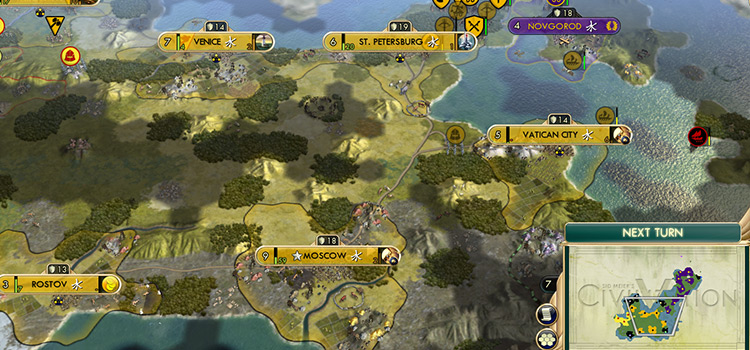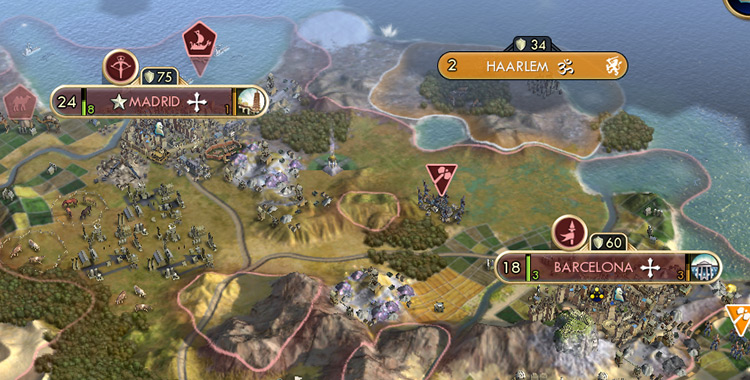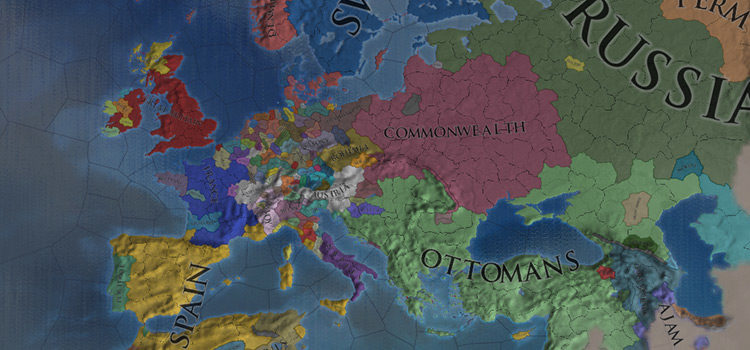Civ 5: What Does Tall and Wide Mean? (Tradition vs. Liberty)
This post may contain affiliate links. If you buy something we may get a small commission at no extra cost to you. (Learn more).
Tall and wide are two common play styles in many 4X games. In Civ 5, these two function as a spectrum:
- Grow Tall: You prefer to concentrate on just a few cities and maximize their output
- Expand Wide: You want to build many cities and have the ability to mass produce units
These are best represented by the two starting social policy trees — Tradition and Liberty.
Differences at a Glance
Tradition and Liberty are the recommended picks for your starting social policy trees. They’ll define your trajectory for the rest of your game.
Plus, they’ll give you huge bonuses in their respective playstyles:
- Growth for Tradition
- Expansion for Liberty
Here’s a table for a side-by-side comparison of their bonuses:
| Type | Tradition | Liberty |
|---|---|---|
| Exclusive Wonder |
Hanging Gardens
|
Pyramids
|
| Opener |
+3 culture in the capital
-25% culture required for border growth in all cities |
+1 culture per city |
| Policy |
+15% production when constructing Wonders
+1 happiness for every 10 citizens in a city |
+1 production in every city
+15% production when constructing buildings and Wonders |
| Policy |
No maintenance costs for garrisoned units
+50% ranged combat strength for garrisoned cities |
+25% tile improvement speed for workers
Spawns a worker in the capital |
| Policy | Free monuments in your first four cities |
+50% faster production of settlers in the capital
Spawns a settler in the capital |
| Policy | +1 gold and -1 unhappiness for every 2 citizens in the capital |
+1 happiness per city connected to the capital
-5% unhappiness from citizens in non-occupied cities |
| Policy | +10% growth and +2 food in the capital |
New cities only increase the culture costs of policies by 33% less than normal
Starts a Golden Age |
| Finisher |
+15% growth in all cities
Free aqueducts in your first four cities Allows buying Great Engineers with faith |
Spawns a Great Person of your choice |
Which One Should You Choose?
Starting geography:
- If you’re hemmed in by mountains and oceans, pick Tradition.
- If there’re plenty of open areas scattered with lots of resources, go for Liberty.
Civ abilities:
- Liberty enables militaristic civs (like Greece and The Huns) to overpower other civs in the early game. By having multiple cities, they can produce units en masse.
- Tradition complements the abilities of science- and Wonder-focused civs like Egypt and Korea.
Map size:
- In small maps, Tradition is the most sensible option since you won’t be expanding that much anyways.
- Larger maps let you get the most out of Liberty’s bonuses.

Which Victory Types Are Best?
Generally, this depends on which resource you’ll need.
Tradition for Science & Culture
First, you must understand how tech and social policies work:
- You gain +1 science per citizen (or “pop”)
- Your research and culture costs increase by 5% per city
With Tradition, you have more pops concentrated in just a few cities. It also gives you free monuments for your first four cities and +3 culture in your capital.
You’ll be producing more science and culture while keeping your costs down.
So if you’re aiming for a Science Victory or a Cultural Victory, Tradition is your best bet.
Liberty for Production & Faith
Faith is primarily generated by shrines and temples.
Both can be built only once in each city.
Liberty encourages having multiple cities, which means you can have more faith-generating buildings.
That’s also why it’s better at unit production. A city can only create units one at a time. With Liberty, you’ll have several cities producing units in parallel.
These make Liberty great for an early Domination Victory.






